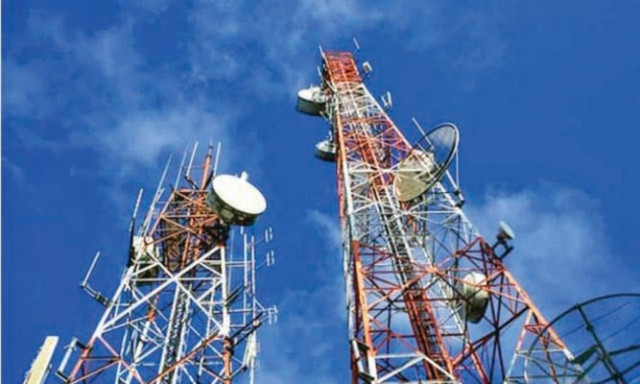Telecommunication sector shines
Segment achieves significant milestones during outgoing calendar year

Stakeholders from the telecom sector of Pakistan have cherished that 2021 proved to be a remarkable year for the segment as it achieved some significant milestones during the 12 months in question. Speaking to The Express Tribune, SI Global CEO Noman Ahmed Said underlined that the sector outperformed this year. Citing statistics, he said that the tele-diversity touched 85.33% while cellular and 3G/ 4G subscribers rose to 187 million and 106 million, respectively.
“Telecom revenues are also increasing at a steady pace with each passing year,” Said highlighted, adding that in absolute terms, revenues were peaking within the information technology (IT) sector. He was of the view that the largest development this year was drastic increase in local manufacturing and assembly of mobile phones which triggered a reduction in imports. “Overall, 2021 turned out to be a robust year for the telecom sector,” he remarked.
Said mentioned that the telecom sector comprised a variety of components including internet, telecom, software, satellite and cable. He added that Pakistan was focusing on holistic improvement of the sector alongside its sub categories. “Globally, we may take inspiration from Verizon, AT&T and Deutsche Telekom which are the best telecommunication companies in the world,” he said. The onset of Covid-19 brought a tremendous increase in telecommunication traffic in Pakistan and the sector dealt with it very well, Said underlined.
The country witnessed development in many sectors however the most notably influx was in the e-commerce segment, he highlighted. During the year, Pakistan saw remarkable increase in data traffic across its rural and remote areas, he said. This caused an uptick in demand of high-speed connectivity, he said adding that it should streamline the advent of 5G in Pakistan. “ Telecommunication emerged as one of the most essential industries since the start of the pandemic hence its steady development should remain our prime target,” Said underlined.
Echoing his views, Information and Communications Technology (ICT) expert Parvez Iftikhar underlined that the number of internet users grew substantially during the year mainly on the back of outbreak of Covid-19. According to him, the most important development during the year was the issuance of the Right of Way (ROW) policy which partially paved the way for infrastructure development in the telecom sector. The relief in taxes for the IT services and local assembly and manufacturing of mobile devices was another important achievement, he added.
“A stronger push to the segment came from the Universal Services Fund (USF) as it expanded broadband services to remote locations of the nation,” Iftikhar underlined. The spectrum auction in Gilgit-Baltistan and Azad Jammu and Kashmir was another huge achievement in 2021, he added.
Not so bright performance
Iftikhar noted that the negative developments during the year included failed spectrum auction, persistent delay in regulatory framework related to infrastructure sharing and dismal permeation of internet of things (IoT) in the society, Iftikhar highlighted. “The quality of the internet, particularly in smaller cities, continued to remain pathetic,” he lamented.
There were no visible efforts to promote optic fiber penetration in urban areas, Iftikhar added. Moreover, Said was of the view that the major challenge faced this year in the telecom space was the increase in cybercrimes. There is a need to take corrective measures to arrest the growth in cybercrimes, he said.Regarding connectivity, he mentioned that in Azad Jammu and Kashmir and Gilgit-Baltistan, students had to cover drastic distances to secure a reliable internet connection for their online classes. Citing Speedtest Global Index statistics, Said revealed that Pakistan’s internet speed was 17.95 megabytes per second (mbps) on mobile devices and 10.84 mbps on fixed broadband as of January 2021.
“Compared to neighbouring countries, this is quite low,” he said adding that the reasons could be the limitation of maximum available bandwidth per site and low penetration of fiber cable infrastructure. “Fast internet is a driver of growth and it has a prolific impact on GDP (gross domestic product),” Said underlined. Higher speed would help in rapid money transfers, online shopping and education, he said. “In short, it creates a positive impact on the overall economy besides indirectly adding value to other sectors,” he added. In 2020, the telecom sector contributed Rs278 billion to the national exchequer and fetched $622.5 million (or 24%) in foreign direct investments (FDI), according to the Pakistan Telecommunication Authority (PTA).
“A national bandwidth policy is also on the cards,” he said, adding that a phased approach with initiative and drive was needed so that the performance could be measured against goals. “Technology affects almost every aspect of the 21st century,” Said underlined. “It has impacted human life from antiquity until now by solving problems associated with our daily life.” Pakistan is witnessing establishment of startups in Gilgit-Baltistan and adjoining areas and in the near future “we may even see its advancement as a smart city”, Said highlighted.



















COMMENTS
Comments are moderated and generally will be posted if they are on-topic and not abusive.
For more information, please see our Comments FAQ